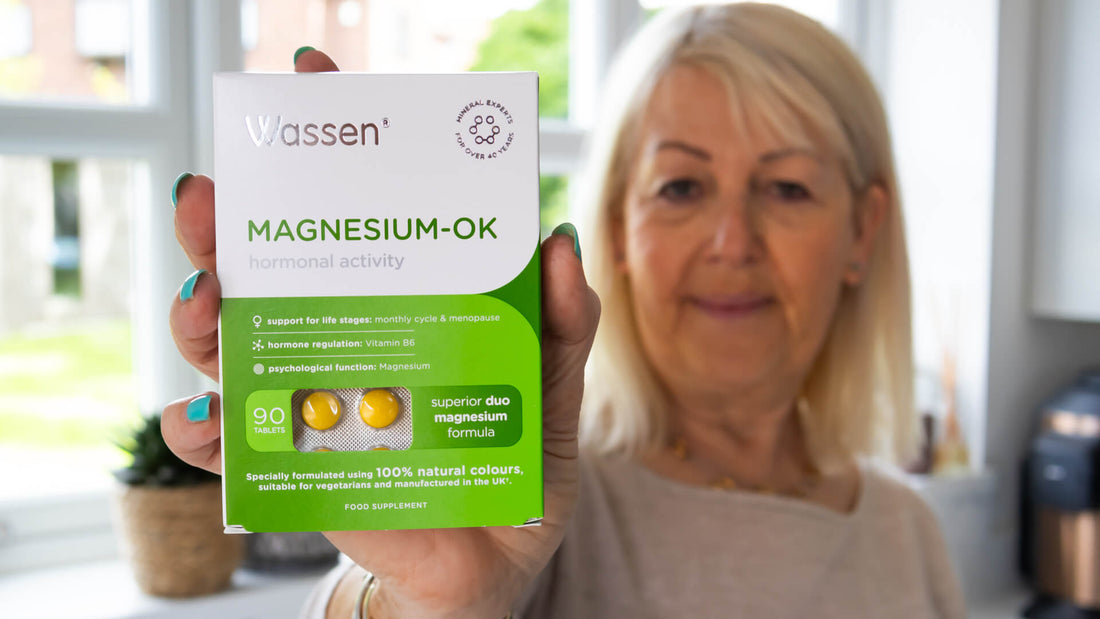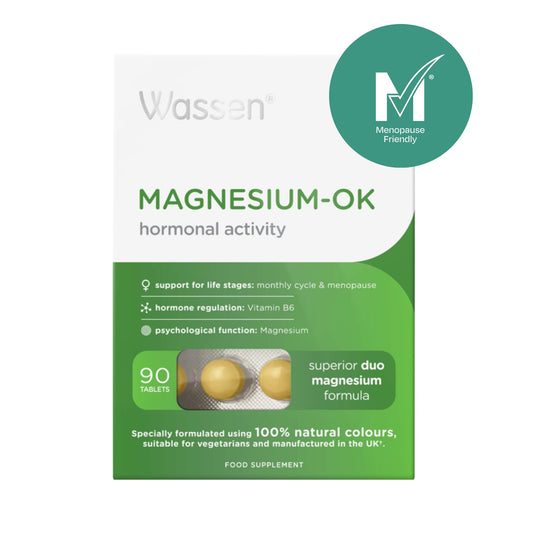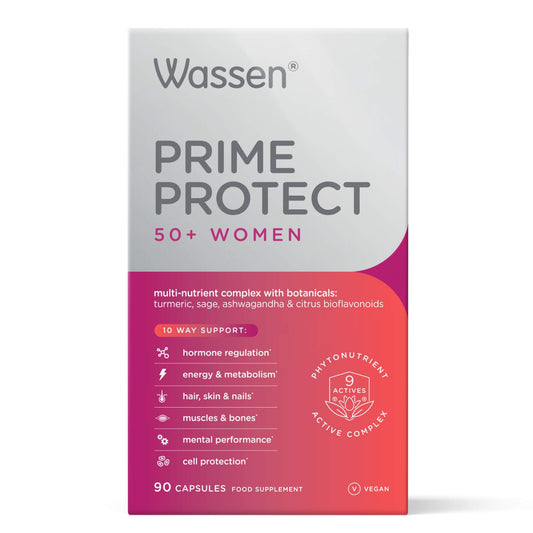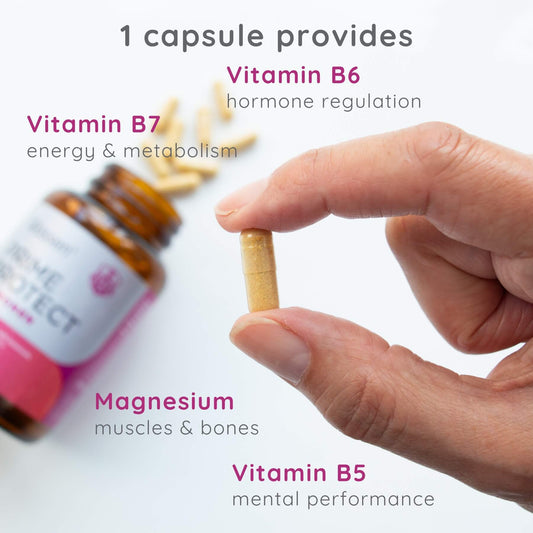Women’s health focuses on the health needs and life stages unique to women. Traditionally, women were excluded from research, however, the physiology and nutritional needs of women are understood as being different to men. Diet and supplements can help improve and maintain women’s health.
Magnesium-OK combines 8 vitamins and 6 minerals to support women’s health. The supplement was formulated based on scientific research and a deep understanding of the symptoms many women experience when transitioning through the different stages of life.
What are the symptoms of a period?
There are a wide variety of symptoms that can occur around the time of a period. These vary from person to person, but the most common include:
- Cramps
- Bloating
- Breast tenderness
- Mood swings
- Fatigue
- Headaches
- Acne breakouts
- Diarrhoea
- Trouble sleeping
The two main reasons a woman will experience symptoms during a period are fluctuations in hormones and the actions of specific hormone-related chemicals.
- Hormonal Fluctuations: The menstrual cycle is driven by the rise and fall of oestrogen and progesterone. In the days leading up to your period, oestrogen and progesterone levels drop. This drop is thought to be a major contributor to premenstrual syndrome (PMS) symptoms like mood swings, fatigue, and headaches.
- Prostaglandins: These are hormone-like chemicals that cause the uterus to contract to shed its lining. While this is necessary for menstruation, it can also lead to cramping pain. Prostaglandins may also be involved in other symptoms like bloating and diarrhoea.
As a woman progresses into menopause, her symptoms and health concerns will change.
What are the common symptoms of menopause?
- Changes in menstrual periods: This is usually the first sign. You might experience irregular periods, heavier or lighter bleeding, or periods stopping altogether.
- Hot flashes: These are sudden feelings of intense heat, often in the face, neck, and chest. They can cause sweating, dizziness, and chills.
- Night sweats: Similar to hot flashes but occurring during sleep and disrupting it.
- Vaginal dryness: Due to decreased oestrogen levels, vaginal tissues can become thinner and drier, leading to discomfort during sex and increased risk of urinary tract infections.
- Sleep problems: Hot flashes and night sweats can disrupt sleep, leading to fatigue and daytime sleepiness.
- Changes in mood: Anxiety, irritability, mood swings, and even low mood or depression are common.
- Reduced sex drive: Decreased oestrogen levels can affect libido.
- Headaches: You might experience more frequent headaches than usual.
- Joint and muscle aches: These can be caused by hormonal changes.
- Skin and hair changes: Skin may become drier and thinner, and hair loss or thinning can occur.
Puberty, periods, and menopause are a natural and inevitable part of a woman’s life. Lifestyle choices, including diet and exercise, sleep, and stress management, can play a role in easing some of the symptoms that come alongside these transitions.
We’ve researched nutrients that may support the symptoms of women's health to formulate a supplement to support women on their journey from starting their monthly cycle, through the reproductive ages and then onto menopause.
Key Nutrients in Magnesium-OK
Vitamin D
Studies investigating the impact of vitamin D on PMS symptoms in women with deficiency show promising results[1]. While the extent of symptom reduction varies, most studies report some improvement which is why you can find it in Magnesium-OK.
Vitamin E
Studies have found that high intakes of vitamin E may improve the mental symptoms of PMS. There is also a small amount of evidence to suggest that vitamin E supplementation can improve cyclic mastalgia pain.[2]
Vitamin C
While there are no studies specifically linking vitamin C to the menstrual cycle, it is recognised by The European Food Safety Authority for its health benefits in contributing to the reduction of tiredness and fatigue and normal psychological function, which are associated with cyclic symptoms. Vitamin C also increases iron absorption from food.
Thiamine (Vitamin B1)
Thiamine has also been studied for its ability to improve PMS symptoms[3]. It is also involved in normal psychological function.
Riboflavin (Vitamin B2)
Riboflavin may be beneficial for individuals who experience headaches as part of their menstrual cycle or menopause symptoms, as supplementation with this vitamin may be effective in reducing migraine frequency.[4]
Folic Acid
It is beneficial for women of child-bearing age who are planning a pregnancy to supplement with folic acid as supplemental folic acid intake increases maternal folate status. Low maternal folate status is a risk factor in the development of neural tube defects in the developing foetus.
Pyridoxine (Vitamin B6)
Doses of 50 to 100mg of vitamin B6 daily have shown modest symptom reduction, both physical and psychological, in numerous studies.[5] Vitamin B6 also contributes to normal psychological function, the reduction of tiredness and fatigue and the regulation of hormonal activity. As with any vitamin, the potential benefits of supplementation depend on the severity of the deficiency.
Magnesium
Most trials suggest magnesium supplementation may moderately reduce PMS symptoms. Interestingly, one study indicated a potential benefit when magnesium is combined with vitamin B6.[6] Magnesium is also important for hormonal balance.
Zinc
Preliminary research suggests psychological symptoms of PMS may improve with zinc supplementation.[7] Some studies suggest there might be physical benefits too. However, more detailed studies are needed to understand the effects on specific physical symptoms. Zinc also contributes to normal fertility and reproduction and is important for healthy hair, skin and nails.
If you have any questions, feel free to drop us a message at info@wassen.com
References:
[1] Links to Vitamin D studies:
- https://pubmed.ncbi.nlm.nih.gov/31104056
- https://pubmed.ncbi.nlm.nih.gov/27095989
- https://pubmed.ncbi.nlm.nih.gov/29447494
- https://pubmed.ncbi.nlm.nih.gov/31624297
- https://pubmed.ncbi.nlm.nih.gov/26724745
[2] Links to Vitamin E studies:
- https://pubmed.ncbi.nlm.nih.gov/26793260
- https://pubmed.ncbi.nlm.nih.gov/19614907
- https://pubmed.ncbi.nlm.nih.gov/27095989/
[3] Link to Thiamine study:
https://pubmed.ncbi.nlm.nih.gov/25363099
[4] Link to Riboflavin studies:
- https://pubmed.ncbi.nlm.nih.gov/19649688
- https://pubmed.ncbi.nlm.nih.gov/15257686
- https://pubmed.ncbi.nlm.nih.gov/9484373
[5] Link to Pyridoxine studies:
- https://pubmed.ncbi.nlm.nih.gov/10746516/
- https://pubmed.ncbi.nlm.nih.gov/3299182
- https://pubmed.ncbi.nlm.nih.gov/2558186
- https://pubmed.ncbi.nlm.nih.gov/3891456
[6] Link to Magnesium and Vitamin B6 study:
- https://pubmed.ncbi.nlm.nih.gov/25276694
[7] Link to Zinc studies:
- https://pubmed.ncbi.nlm.nih.gov/31154571/
- https://pubmed.ncbi.nlm.nih.gov/28188965/





